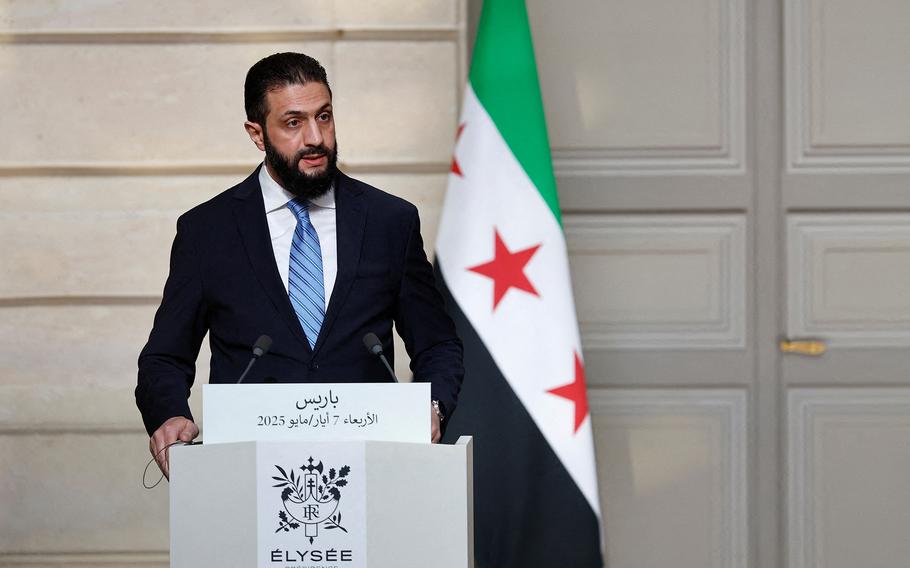
Syrian President Ahmed al-Sharaa speaks during a joint press conference with French President after a meeting at the Elysee Palace in Paris, on May 7, 2025. Syrian interim President Ahmed al-Sharaa arrived in Paris on May 7, state media reported, on his first visit to Europe since overthrowing longtime ruler Bashar al-Assad in December. (Stephanie Lecocq/POOL/AFP via Getty Images/TNS)
(Tribune News Service) — Israel expressed openness to peace with Syria, a change of tack after warning against engaging with the new Islamist-rooted government that took power last year.
The overture came amid calls by U.S. President Donald Trump for a ceasefire with Hamas in Gaza and predictions that more Middle East countries would join a regional peace pact with Israel after this month’s war against Iran.
“We have new opportunities in front of us,” Israeli Foreign Minister Gideon Sa’ar told reporters on Monday. “We have an interest in adding countries, such as Syria and Lebanon, our neighbors, to the circle of peace and normalization — while safeguarding Israel’s essential and security interests.”
The comments appear to represent a change of heart by Israeli Prime Minister Benjamin Netanyahu, who ordered his military to occupy positions in Syrian territory soon after a group led by Ahmed al-Sharaa overthrew the long-standing regime on Bashar al-Assad in December.
Al-Sharaa, now Syria’s president, used to be an Al-Qaeda militant and fought U.S. troops in Iraq. He says he’s reformed and Syria poses no threat to neighboring Israel. Even so, the Israeli government called him and his followers “wolves in clothes of sheep” and warned the world not to be “fooled” by them.
Yet since then Israel has dealt a major blow to Iran, which opposes peacemaking with the Jewish state, via a 12-day war that ended with a ceasefire last week. Trump has said the truce, which he brokered, is an opportunity for Israel to expand its diplomatic relations with states in the region.
The U.S. leader also met al-Sharaa last month in Saudi Arabia and, in a move that initially shocked Israel, said he wanted to remove sanctions on Syria.
There’s no guarantee Israel will manage to forge formal relations with Lebanon or Syria. In the former, Hezbollah, an Iran-backed militant group that vows to destroy Israel, remains influential even after being severely degraded by Israeli attacks last year. Negotiations with Damascus could be complicated by Sa’ar stating that Israel would retain the Golan Heights. Israel captured the heights from Syria in the 1967 Six Day War and annexed it a few years later.
Sa’ar did not answer a question over whether Israel might return the tracts of Syrian territory it seized after Assad’s ouster. Nor did he mention al-Sharaa by name. Previously, Sa’ar and other Israeli officials referred to the Syrian president by his nom de guerre from his Al Qaeda days, Abu Mohammed Al-Jolani.
Another potential obstacle could be the status of hundreds of thousands of Palestinians — refugees from the 1948 war of Israel’s founding and their descendants — living in Syria and Lebanon.
Interviewed by Fox News on Sunday, Trump said “some really great countries” — which he did not name — want to join the U.S.-backed Abraham Accords, which saw the United Arab Emirates and Bahrain normalize ties with Israel in 2020.
Asked if Syria might be a candidate, Trump said: “I don’t know, but I did take off the sanctions at the request of some of the other countries in the area that are friends of ours.”
©2025 Bloomberg L.P.
Visit bloomberg.com.
Distributed by Tribune Content Agency, LLC.